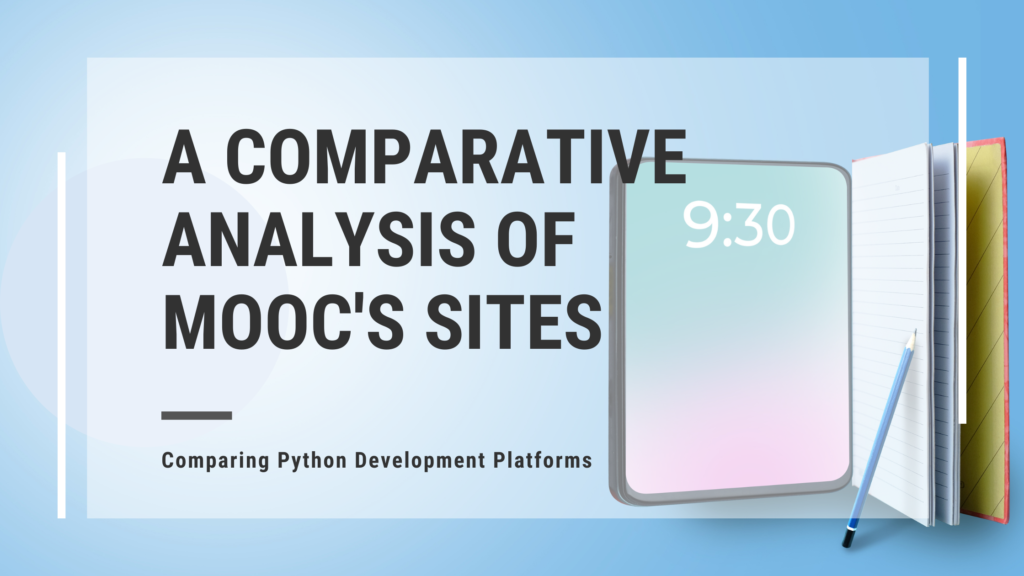Exploring Python Course Platforms: CADD Centre Vs MOOC’S Sites
There are numerous learning platforms and websites that offer a wide range of Python courses suitable for beginners, intermediate learners, and advanced programmers.
Three of the most popular platforms that offer Python courses include:
Udemy (www.udemy.com)
Coursera (www.coursera.org)
edX (www.edx.org)
MOOCs platforms and Python
These platforms are also known as MOOCs portals – wherein the acronym stands for Massive Open Online Courses, as they offer courses that are accessible to a large number of learners from around the world.
They typically offer open enrollment, allowing anyone to join the course without specific prerequisites or requirements. Some of the common features of these platforms include:
Video Lectures:
These platforms provide video lectures as a primary mode of content delivery. Instructors or subject matter experts create video lessons that learners can access and watch at their own pace.
Self-paced Learning:
Coursera, Udemy, and edX offer self-paced learning options, allowing learners to start and complete courses at their own convenience.
Hands-on Practice:
All three platforms recognize the importance of hands-on practice in the learning process.
They often include coding exercises, quizzes, assignments, and interactive activities to help learners reinforce their understanding and apply what they’ve learned.
Community Interaction:
Each platform fosters community interaction and peer learning. Discussion forums and community spaces allow learners to engage with each other, share ideas, and collaborate on projects.
Differentiators of CADD Centre’s Learning Portal
CADD Centre is Asia’s largest network of skill development centers with its presence in over 750 locations in India and 24 countries across the world, including the Middle East, and Africa.
Its offline platform (www.caddcentre.com) is a robust destination for Python training that boasts of all standard learning/teaching features of MOOC platforms.
However, it is unique in the following respects:
Instructor-Led Training (ILT):
CADD Centre offers ILT courses that involve real-time instruction delivered by an instructor. The instructors undergo training from the Internal Training Academy of the CADD Centre.
They guide students through the course material, provide explanations, clarify doubts, and facilitate discussions.
Students can ask questions, share insights, and engage in discussions with the instructor and other students.
Structured Schedule:
CADD Centre’s ILT courses are typically scheduled at specific times, and students need to join the session as per the predetermined schedule.
(Note: CADD Centre also offers self-paced courses, where students have the flexibility to access the course material at their convenience).
Blended Learning Approach:
Students have the opportunity to learn and get guidance from instructors in physical classrooms at the CADD Centre institutes near them.
Live Projects:
The courses offered by CADD Centre are designed to meet the requirements of specific industries and are aligned with industry standards.
The platform often includes practical projects and assignments to provide hands-on experience and help learners apply their knowledge to real-world scenarios.
Certifications:
Successful completion of the courses on the CADD Centre Learning platform leads to certifications that are endorsed by competent industry and government bodies like the National Skill Development Corporation, and the Government of India.
Placement Support:
Depending on the courses enrolled, CADD Centre offers placement services to all students who have successfully completed their courses.
The placement assistance processes include:
- Pre-placement discussions
- Educational qualification evaluation
- Assessment tool test
- Score analysis
- Scheduling technical & HR interview
- Assistance in the issuance of offer letters
| Feature | CADD Centre | MOOCs (Coursera, Udemy, edX) |
| Course Delivery | Instructor-Led Training (ILT) | Self-paced video lectures |
| Learning Flexibility | Structured schedule or self-paced | Self-paced, flexible learning |
| Hands-on Practice | Yes, with coding exercises | Yes, with coding exercises |
| Community Interaction | Yes, in-person and online | Online community forums |
| Real-world Projects | Included | Varies by course |
| Certifications | Industry/government endorsed | Course-specific certificates |
| Placement Support | Available for qualified students | Not typically provided |
Python Courses @ MOOCs
The MOOCs platforms offer Python courses for all levels of learners – beginners, intermediate, advanced, and mixed.
The duration varies anywhere from a few months to a few years with classes spread out from 1-4 weeks to 3-6 per month.
Coursera and edX list the institutions that offer the courses.
The institutions could be a college or university or a tech giant like Google or IBM, or tech companies like DeepLearning.AI.
It’s worth noting that while Coursera and edX have partnerships with renowned universities and educational institutions, Udemy follows a different model where instructors can create and publish courses independently.
As a result, Udemy offers a larger variety of courses, but the quality and accreditation may vary between courses.
Students can select a course going by the star ratings of learners.
Python Training @ CADD Centre
Going by its stated objective of being “skills-driven, job-led”, CADD Centre is focused on providing job-oriented courses.
The objective holds true for Python courses and training as well.
The platform tailor-makes Python courses for specific domains, such as e-commerce, fintech, retail, logistics, and healthcare.
However, the courses are also accommodative, in the sense even beginners can enroll in its Python courses as the platform provides a 10-hour preparatory program that imparts a basic understanding of programming.
The topics covered in this introductory module include software applications; system overview; methodologies; requirement gathering; design & development; testing & deployment, and industry applications of Python.
The intermediate and advanced level courses skip the preparatory module.
They are based on Essentials in Python (50 hours), and Proficient in Python (40 hours), which provide in-depth training keeping Python’s applications in specific industries in mind.
While both offer video lectures, interactive coding exercises, quizzes, and assignments to facilitate effective Python learning, CADD Centre sets itself apart with its unique employment-oriented approach.
Unlike traditional MOOC platforms, CADD Centre’s courses are specifically designed to cater to industry needs, targeting specific sectors and industries.
They adopt an Instructor-Led Training methodology, and the institute extends end-to-end placement services.
The certifications come with third-party endorsements, expanding the scope of employment opportunities for students




